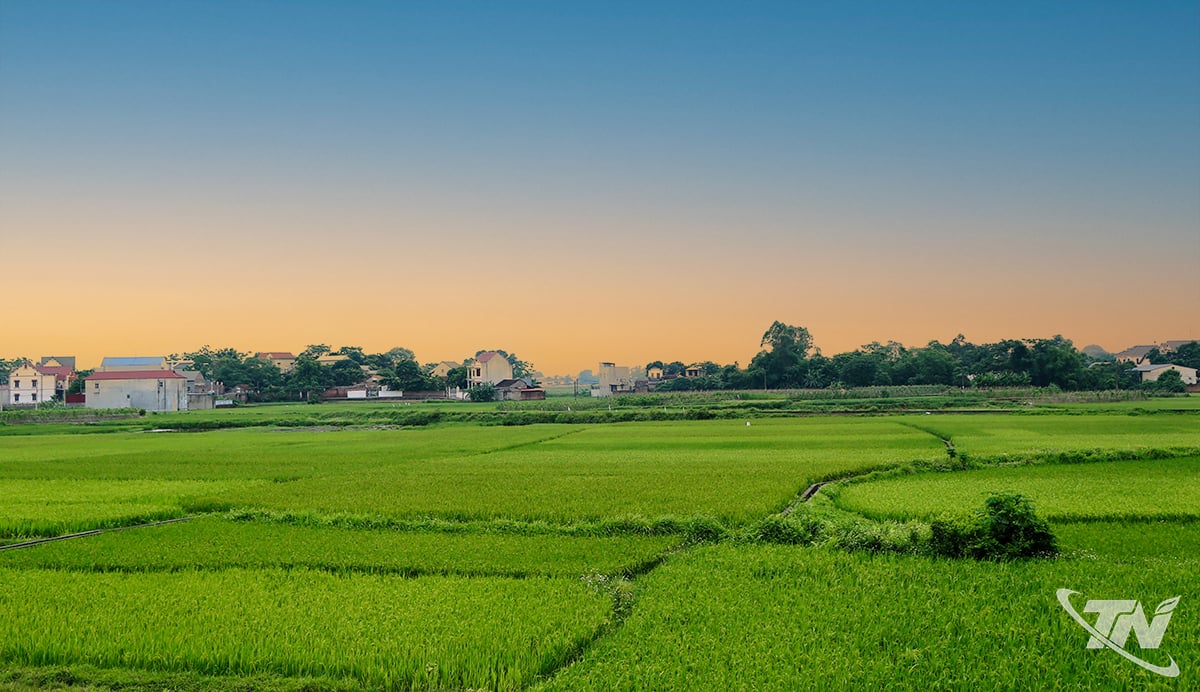 |
| Peaceful scenery along the Cau River, where folk songs once echoed. |
Ups and downs of folk songs and folk songs
Folk songs are a simple form of spiritual activity of farmers in the lower reaches of the Cau River. Without a stage, without musical instruments, without formal training, Vi songs are sung naturally like daily conversation, thinking and singing.
Lyrics can be passed down orally through many generations, sometimes mixed with folk songs, proverbs, and even the Tale of Kieu. Vi singers are not constrained; they are free to create, as long as the song expresses love for their homeland, village, and love between couples.
Mr. Ngo Manh Tuoc, nearly 90 years old, a former cadre of the old Dong Cao ward, took us back in time. He said: no one knows exactly when the singing of Vi appeared, only that it was bustling during the feudal years, and lasted until after the August Revolution. On bright moonlit nights, villagers gathered at the riverside, communal house yard, singing to each other. The majority of the participants in singing Vi at that time were middle-aged and elderly people.
After that, for unknown reasons, the singing movement gradually died out. Until after the land reform (from around 1954-1957), cooperatives and labor exchange groups appeared. When farmers had land, people's lives improved, the singing movement became active again and lasted until around 1959, then quietly died out when other forms of entertainment appeared and dominated, Mr. Tuoc added.
By 2014, thanks to the attention of the cultural sector and local authorities, this tune was restored. Thirty people who had been attached to hat vi since the old days practiced together, performing old scenes: bailing water on a moonlit night, meeting in the communal house yard, on the wharf and under the boat… Unfortunately, as Mr. Tuoc said, everything “just stopped there”.
The ancients are now old, their breaths are short, their voices are hoarse. They still remember the songs, they still keep their souls, but their strength does not allow them to sing as before. The most precious thing that remains are more than 100 recorded songs, as evidence of a brilliant folk cultural life.
Not only singing Vi, people on both banks of Cau River are also passionate about Ho. Ho is different from Vi in that the singers can respond to each other without seeing each other. The boy can stand outside the village gate and sing, the girl can listen and respond in the village. Sometimes, just from a starting Ho line, it can last all night, until one side "runs out of words".
Mrs. Hoang Thi Van, now in her sixties, is famous in the village for her intelligent singing ability, but still remembers clearly the year 1983, when she sang with a boy from a neighboring village for seven months straight. The two only knew each other through singing voices, had never met, but had a feeling of familiarity and understanding.
Mrs. Van said: That person sings very well and intelligently. I used to sing with many people but only a few sentences and then stop. Only with him, we sang continuously for half a year. Then one day, he joined the army, and from then on, I didn't sing with anyone anymore.
When I asked to hear her sing a few old folk songs, Mrs. Van smiled happily, her voice singing as if bringing the whole space back to the riverside village scene forty years ago.
Mrs. Van said, once the groom's family asked for her name, she improvised: "My real name is May, and where I live is at the gate of heaven." Because she didn't want to reveal her home, she just said her name backwards (Van - May).
But immediately, the opponent replied: "I wish you could become Pham Tuan, fly into space and go to the moon...".
Memories of youth flooded back, Mrs. Van smiled again, her eyes sparkling. One day, she had to stay home to pick peanuts, and it was late when she could go out singing. As soon as she heard her voice, the young man said: "Where have you been since last night? You've been making me wait, you've been waiting, you've been longing." She immediately replied: "My family is busy with their own affairs, milling rice and pounding rice, and there's no one to help."
Until one day, before the day of enlistment, he sang: "Go home and ask your mother and father. When the day is good, you can come over." She replied: "Your mother and father have already asked. This month is not good, so save it for next month." He sang again: "Go home and ask your mother and father. If you don't get married this month, next month you will leave." She replied: "You can go ahead, I will take care of the flower garden, I will take care of the vegetable garden..."
After that night, the date ended, the young man left, and from then on, the two never met again through the date.
Keep the old marks in the song
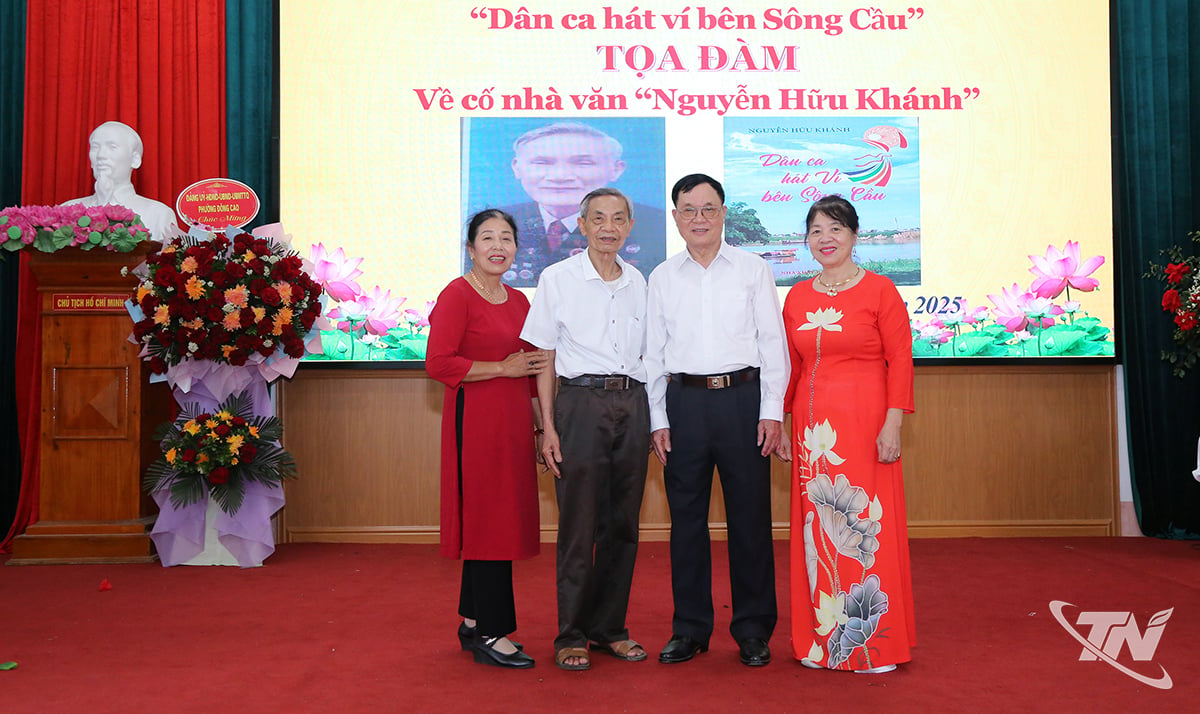 |
| From left to right, Ms. Hoang Thi Van, Mr. Ngo Manh Tuoc and members of the group that collected and compiled the manuscript "Folk songs singing on the Cau River" at the work's introduction. |
Nowadays, the industrial pace of life has swept away many traditional values. Worried about this, a son of the old Dong Cao land - the late writer Nguyen Huu Khanh, when he was still alive, built a survey map. In the two years 2015-2016, he traveled by old bicycle to more than 10 communes along both sides of the Cau River, meeting over 50 people to directly listen to them sing and tell stories. He also pondered dozens of books, looking for each piece of material to piece together a complete picture of hat vi.
The result of that journey is a thick work that takes readers back in time, back to the communal house yard, the waterfront of the old nights of conversation. What is even more precious is that in the manuscript, the author left a message: hoping that readers, those who are in tune, would add and edit to make the work more complete. It is that humility that has opened up like a cultural stream that needs to be continued.
Five years after his passing, the unfinished manuscript has found its way back to readers. A research group, who are the children of Pho Yen land, carefully edited, completed and published the book “Folk songs and songs on the banks of Cau river” as a way to preserve the soul of the homeland.
The Cau River still flows quietly, carrying with it layers of silt and echoes of the past. The sounds of the folk songs and folk songs may not be as lively as they once were, but they have never disappeared. They remain in the memories of those who once sang them, in the writings of those who silently preserved them, and in the desire to pass them on.
Source: https://baothainguyen.vn/van-hoa/202509/mot-thoi-ho-doi-ven-song-2706b59/







![[Photo] Prime Minister Pham Minh Chinh attends the groundbreaking ceremony of two key projects in Hai Phong city](https://vphoto.vietnam.vn/thumb/1200x675/vietnam/resource/IMAGE/2025/9/27/6adba56d5d94403093a074ac6496ec9d)







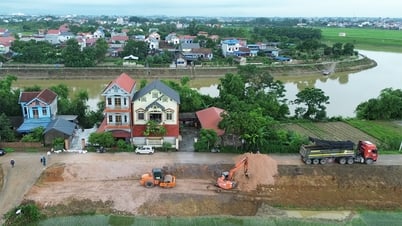























































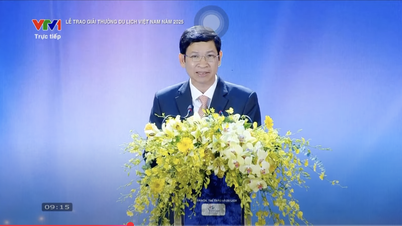


































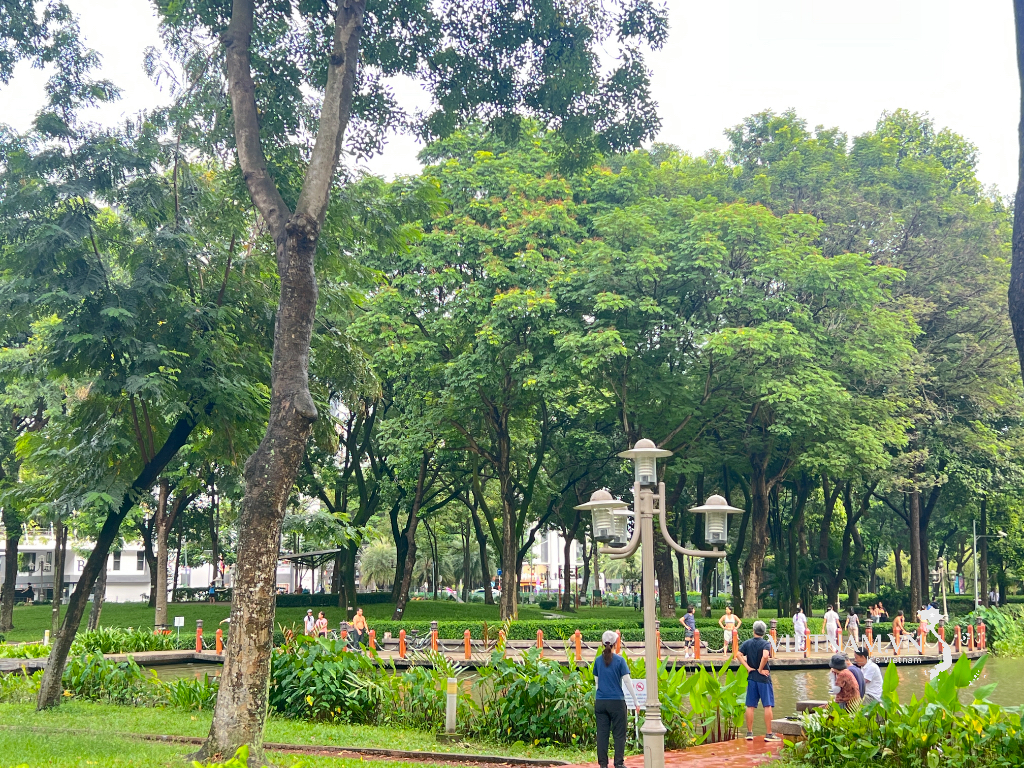


Comment (0)